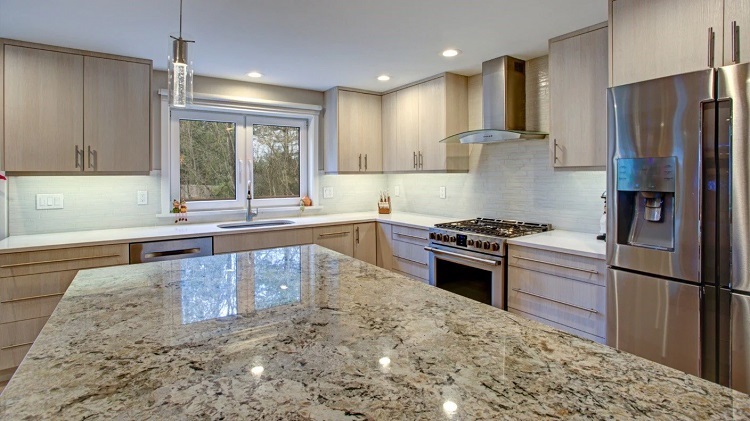In the realm of kitchen remodeling and design, few decisions are as pivotal as choosing the right countertops. Beyond aesthetics, countertops play a crucial role in functionality, durability, and overall kitchen ambiance. Among the plethora of options available, quartz and granite countertops stand out as perennial favorites, each boasting unique qualities that appeal to homeowners. But when faced with the choice between quartz and granite, how do you determine which material is the right fit for your kitchen? Let’s delve into the comparative analysis of quartz countertops vs granite countertops to aid you in making an informed decision.
Table of Contents
Understanding Quartz Countertops
Quartz countertops, engineered stone surfaces composed of 90-95% crushed quartz crystals and 5-10% resins, offer a blend of durability and aesthetic appeal. Unlike natural stone, quartz countertops are manufactured, allowing for a wide range of colors, patterns, and finishes to suit diverse design preferences. Because of their adaptability, quartz countertops are a popular option for contemporary kitchens looking to seamlessly combine elegance and practicality.
The non-porous aspect of quartz countertops is one of their main benefits. The resin binders used in their production create a surface that is highly resistant to stains, scratches, and bacterial growth, making them exceptionally low-maintenance and hygienic. Unlike granite, quartz countertops do not require sealing, simplifying upkeep and prolonging their pristine appearance over time.
Furthermore, quartz countertops offer uniformity in color and pattern, ideal for homeowners seeking consistency in their kitchen design. This consistency extends to their durability, as quartz countertops are less prone to cracking or chipping compared to natural stone alternatives like granite.
Exploring Granite Countertops
Granite countertops, revered for their natural beauty and timeless elegance, are quarried slabs of igneous rock formed over millions of years. Each granite slab boasts a unique blend of minerals, veining, and color variations, ensuring that no two countertops are identical. This inherent uniqueness adds a touch of character and sophistication to any kitchen, making granite countertops a coveted choice for traditional and contemporary settings alike.
One of the standout features of granite countertops is their exceptional heat resistance, capable of withstanding high temperatures without warping or discoloration. This attribute makes granite countertops an ideal surface for avid cooks who frequently utilize hot pots and pans in their culinary endeavors.
Moreover, granite countertops offer unmatched natural beauty, showcasing the intricate patterns and veining created by geological processes. From earthy tones to vibrant hues, granite countertops provide a rich tapestry of colors that can complement a wide range of kitchen designs.
However, despite their inherent beauty and durability, granite countertops require regular sealing to maintain their integrity and prevent staining. Additionally, the natural porosity of granite makes it more susceptible to bacterial growth and staining compared to non-porous quartz countertops.
Making the Right Choice
When it comes to choosing between quartz countertops and granite countertops, several factors must be considered to ensure the selection aligns with your preferences and lifestyle.
- Aesthetic Preference: Do you prefer the natural beauty and variability of granite or the uniformity and versatility of quartz?
- Durability and Maintenance: Are you willing to invest in regular sealing and maintenance for granite countertops, or do you prefer the low-maintenance appeal of quartz?
- Heat Resistance: Will your kitchen see heavy use of hot pots and pans, necessitating the heat resistance offered by granite countertops?
- Budget: Consider the upfront cost and long-term maintenance expenses associated with both quartz and granite countertops.
- Overall Design Scheme: Assess how each material complements your kitchen’s design theme, cabinetry, and flooring choices.
Ultimately, the decision between quartz and granite countertops boils down to personal preference, lifestyle considerations, and budget constraints. Whether you prioritize durability, aesthetics, or ease of maintenance, both quartz and granite countertops offer distinct advantages that can elevate the functionality and visual appeal of your kitchen.
In conclusion, the choice between quartz countertops vs granite countertops is a subjective one, influenced by individual preferences and practical considerations. By weighing the pros and cons of each material and considering your unique needs, you can make an informed decision that transforms your kitchen into a culinary haven tailored to your lifestyle and tastes.

